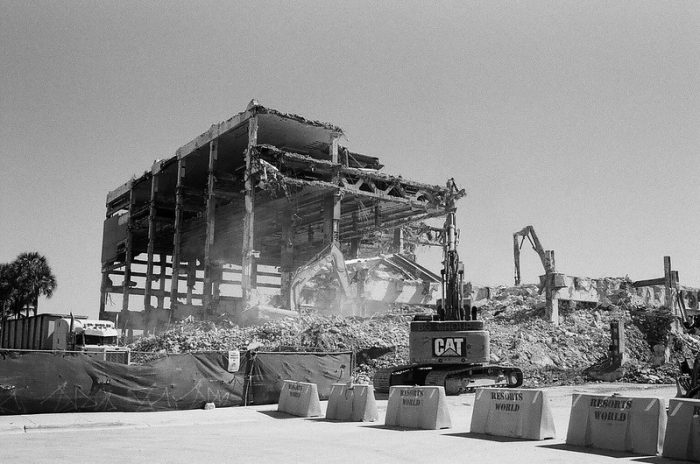
Eventually, whenever coronavirus cases in Florida steadily decrease (not anytime soon, it appears) and journalists start to return to their newsrooms, the folks at the Miami Herald and El Nuevo Herald will continue to work from home.
Parent company McClatchy announced on Tuesday that starting in August, six of its news outlets — the Herald, Charlotte Observer, The State (Columbia, South Carolina), The Modesto Bee, The Merced Sun-Star, and The Tribune (San Luis Obispo, California) — as well as its Washington, D.C. bureau will give up their office leases.
“We know that the office space of today is not what the office space will be for tomorrow as it relates to social distancing and keeping our employees safe,” Aminda Marqués González, the president, publisher, and executive editor of the Miami Herald, wrote. “For that reason, Miami Herald and el Nuevo Herald employees will continue to work remotely through the end of the year. After the New Year, once the commercial real estate industry has sorted itself out with regard to new standards and approaches, we will find a new, centralized home.”
“The pandemic has deeply impacted our business, as it has many others. Revenue has fallen, and a timeline of recovery is uncertain,” Charlotte Observer executive editor Sherry Chisenhall wrote. “The move from uptown offices helps ensure that we can keep local journalists on the job, giving our community the daily reporting and accountability journalism you expect from us. Our commitment is as strong as ever to informing the community with essential journalism that helps us all take on the challenges ahead.”
McClatchy filed for bankruptcy in February. Marqués González said that this particular move prioritizes saving jobs “to ensure our readers receive the level of coverage and accountability throughout South Florida they expect each day from our talented journalists.”Newspapers have certainly moved offices before. The Miami Herald shifted to its current office in Doral from Biscayne Bay in May 2013. McClatchy had sold the building to Genting, a Malaysian casino operator that bought it for $236 million with plans to build a casino there. Its sister paper, the Fort Worth Star-Telegram, also moved into a different office, across the street from its original one, in 2011.
But as Poynter pointed out, this is the (maybe temporary) elimination of the newsroom all together. No more water cooler chats, no more standing over your editor as they work on your story (or vice versa), no more popping over to someone else’s cubicle to ask them questions.
At the same time, One Herald Guild, the union of the Miami Herald and El Nuevo Herald, launched a petition on Tuesday asking the bankruptcy judge Michael E. Wiles to reject hedge fund Chatham Asset Management’s bid for the Miami Herald Media Company.
Dear Herald readers: We need your help. A hedge fund, Chatham, is pushing to take over our parent company @mcclatchy in bankruptcy court. This would be a disaster for local journalism in South Florida. Please sign our petition urging the judge to reject it:https://t.co/3K1MvZPYJ4
— One Herald Guild
(@OneHeraldGuild) June 9, 2020
It reads, in part:
We know that leading bidder to assume ownership of the Miami Herald Media Company is Chatham Asset Management — a predatory hedge fund with a history of owning unethical publications like the National Enquirer, slashing jobs and shuttering local papers in Canada. Hedge funds have gutted local newsrooms. We, the Miami community and Herald readers everywhere, refuse to let it happen to the Herald.
We have experienced firsthand the important role of our newspapers in our community, but we also have seen what happens to newspapers as resources diminish. Communities go uncovered, corruption goes unchecked, and the public is left in the dark.[…]
Even with the cuts endured in recent years, the Herald papers remain dutifully committed to original and meaningful reporting. It must be protected and lifted up, not threatened with an owner whose past actions prove it doesn’t care about the public interest.
Under the right ownership, the Herald’s revenue could be used for its right purpose: reporting local news and strengthening democracy, not enriching financiers at the expense of the community in which we live.
The petition so far has secured more than half of the 6,400 signatures it needs.
The Miami Herald is moving buildings to save $.
This year we also:
– scrapped our printing presses
– laid off that staff
– stopped printing on Saturdays
– furloughed the advertising team
– pay cuts for the C-suite https://t.co/5GrSOsEmKx— Alex Harris (@harrisalexc) June 9, 2020
Maybe they have a small space for a few top execs, with meeting rooms for occasional use and a space to entertain advertisers, host ed board guests, etc.
But reporters having a desk they can go to everyday? I'd bet $10 that's just done for good.
— Joshua Benton (@jbenton) June 9, 2020
It's official.
The @MiamiHerald is homeless.
Corporate parent @mcclatchy mismanaged it's crown jewel real estate asset, dumping it for 25 cents on the dollar at the end of the last downturn, leading them to move to a bunker in Doral.https://t.co/6W1ZYbePZ2
— Grant Stern (@grantstern) June 9, 2020
Changing my location to ONLINEhttps://t.co/FQvyAof4o6
— Martin Vassolo (@martindvassolo) June 9, 2020
We sold our golden building on Biscayne Bay to a casino developer and move to Doral. Now the @MiamiHerald will be without a headquarters starting in August. Want to help? Start by signing this. https://t.co/rgu7SIw2pL
— Mary Ellen Klas (@MaryEllenKlas) June 9, 2020
I remember first stepping into The Miami Herald building overlooking Biscayne Bay & feeling its history. I remember the sadness when it was sold & the operation was moved to Doral. Now “vulture capitalists” plan to buy it & this happens
https://t.co/DzVV8V9XGO
— Marc Caputo (@MarcACaputo) June 9, 2020